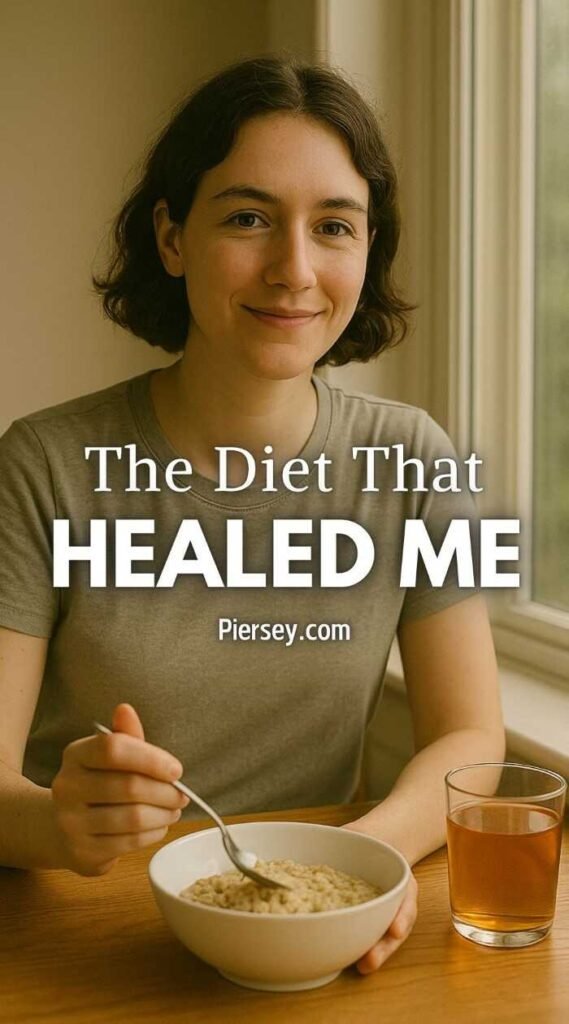I’ve lived both extremes — meat-only and high-carb plant-based vegan — and somewhere between the two, I found the truth.
And I don’t mean some perfect, balanced diet that ticks every macro box. I mean the kind of truth that only shows up after years of doing everything wrong first.
I thought I could discipline my way into peace.
If I could just eat cleaner, stricter, simpler — I’d fix everything.
Turns out, I was just chasing control and calling it “health.”
The carnivore diet gave me that control.
The high-carb plant-based diet gave me calm.
But it took years of trial and error to realize that neither one held the full answer.
And maybe that’s the hardest part — realizing that health isn’t hiding at the edges.
It’s somewhere in the middle, in that boring, quiet space where you stop fighting yourself.
Here’s the vlog version if you prefer to watch instead of read. 👇
When Simplicity Turns Into a Cage
When I started carnivore, I loved it.
It was simple. Predictable. No noise, no rules to interpret — just meat, salt, water.
You don’t overthink meals when every meal looks exactly the same.
It gave me that fake feeling of control — like I’d finally “cracked” food.
No temptation. No guilt.
I could walk past pizza or donuts like they didn’t exist.
At first, it felt like peace.
No cravings, no indecision. Just clarity.
But simplicity can become a cage without you realizing it.
You wake up one day and realize you’ve built your whole life around defending your diet.
You find yourself explaining to people why “plants are toxic,” as if broccoli is trying to assassinate you.
That’s where I ended up — a grown man judging someone for eating an apple.
And what’s worse, I thought I was enlightened.
It wasn’t about food anymore. It was identity.
And the problem with identity-based diets is they don’t let you change without guilt.
I mentioned something similar in a story about what this did to my health.


The First Cracks in the “Perfect” Diet
I didn’t quit carnivore because I lost discipline.
I quit because my body quit first.
Fatty liver. Iron overload. Thyroid hormones crashing.
I remember sitting in a hospital waiting room, scrolling through carnivore Facebook groups, convincing myself it was “detox.”
That’s the lie we tell ourselves when we can’t face reality — that feeling awful means it’s working.
But deep down, I knew.
My digestion was heavy. My sleep was shallow.
I had the kind of fatigue that felt like gravity pulling from inside my bones.
And yet, I stayed on it because I was scared of carbs — terrified, actually.
I believed that one bite of rice would undo years of “clean eating.”
It sounds ridiculous now, but at the time, it was gospel truth.
I remember once standing in a grocery aisle, looking at a banana, and feeling guilt.
A banana.
That’s when I realized something was seriously broken — and it wasn’t just my metabolism.
The Day I Finally Broke the Rules
There wasn’t one big “aha” moment.
It was small. Quiet.
A tired evening, too drained to cook another steak, staring at the rice cooker collecting dust in the corner.
So I said screw it. I made rice.
And not “just a bite.” A full bowl.
I sat down with it like someone sneaking around on their spouse.
I expected bloating, fatigue, water retention — all the “carb horror stories” I’d been told.
But none of it happened.
Instead, I felt something I hadn’t felt in years: relief.
My body exhaled. My heart rate slowed.
It was like flipping off a stress switch I didn’t know had been on.
That night, I slept better than I had in months.
The next morning, I felt almost guilty for how normal I felt.
Like it shouldn’t be this easy.
Like food wasn’t supposed to be this peaceful.
How Letting Go Gave Me Back My Sanity
When I started eating carbs again, I didn’t rush into it.
It wasn’t some dramatic “before and after.”
It was slow — cautious — like making peace with an old enemy.
I added fruit. Then juice. Then lentils.
And each time, I’d brace myself for chaos that never came.
You know what’s wild?
The more I relaxed, the better my digestion got.
The less I obsessed, the better I slept.
The moment I stopped micromanaging my food — my body started managing itself.
I wasn’t chasing “perfect macros” anymore.
I was just eating like a human being again.
And that’s when it hit me — maybe my body wasn’t broken.
Maybe it was just exhausted from all the extremes.
I remember sitting outside one morning with a bowl of rice and strawberries, sunlight hitting my face, and realizing, “This is it. This is peace.”
Not keto peace. Not carnivore peace.
Just… normal peace.
It was the first time I didn’t feel guilty for feeling good.
How It Feels to Live Without Extremes
Life feels different now.
It’s not dramatic. It’s not clickbait. It’s quiet.
On carnivore, I felt powerful — but tense.
Every meal felt like a competition with myself.
I measured worth in macros and willpower.
On high-carb, I feel calm — almost unrecognizably calm.
No more caffeine surges, no more food anxiety.
It’s not flashy.
There’s no “buzz.”
But I can think clearly, move more easily, and actually enjoy food again.
That might not sound like much — but when you’ve spent years fighting your own biology, it’s everything.
The Difference Between Control and Balance
Discipline without peace is just control in disguise.
And control doesn’t last — it breaks you.
The carnivore diet taught me what obsession feels like when you dress it up as discipline.
The high-carb way of eating taught me what real balance feels like — not chasing purity, just choosing consistency.
And that’s the difference.
On carnivore, I was surviving.
On high-carb, I’m living.
I mentioned something similar in another post about finding balance through simple foods.
These days, I don’t measure success in numbers or streaks.
I measure it in how easy life feels.
How peaceful my mornings are.
How uninteresting food drama has become.
The Real Lesson Hidden in Both Diets
The truth? Both sides taught me something I needed to learn.
Carnivore taught me how far I can push my body.
High-carb taught me I didn’t need to.
One taught me discipline.
The other taught me grace.
When I look back now, I can see how both versions of me were trying to heal — just in opposite directions.
On carnivore, I thought control was freedom.
On high-carb, I learned that freedom is being able to eat without guilt.
And honestly, that’s what I was chasing all along — peace with food, peace with myself.
When the Internet Turns Diets into Religion
The funny thing is, the longer you do any extreme diet, the more it starts to sound like a belief system.
You stop talking about food and start talking about faith.
Carbs become “evil.”
Fat becomes “truth.”
And before you know it, you’re arguing with strangers on Reddit about what cavemen might’ve eaten 40,000 years ago.
I used to waste hours defending a way of eating I wasn’t even sure was working anymore.
I’d type out paragraphs about “ancestral living” while ignoring the fact that my sleep was trash and my joints hurt.
It’s weird how diet can sneak into your identity.
You tell yourself it’s about health, but what you’re really chasing is belonging — a group that “gets it.”
Now? I couldn’t care less about winning arguments online.
You can’t argue someone into balance.
They have to burn out on extremes the way I did — by living them.
When “Feeling Normal” Starts to Feel Good
After switching to high-carb, there was no fireworks moment.
It wasn’t like I suddenly woke up glowing.
It was quieter than that.
My energy stopped crashing halfway through the day.
I didn’t wake up with that heavy, dry-mouth dehydration feeling.
I stopped needing four coffees just to function.
It was gradual, like a fog lifting one thin layer at a time.
I started walking again — not to burn calories, just because it felt good.
I cooked because I was curious, not afraid.
I laughed more.
My body stopped being an experiment and started being my home again.
There’s this peace that shows up when you finally stop micromanaging every bite.
It’s not exciting enough for Instagram, but it’s the kind of peace you notice when you’re alone.
That’s how I knew I was healing — not because I looked different, but because I stopped obsessing about how I looked.
Why Control Feels Powerful — and Why It Breaks You
Control gives you results fast, and that’s the trap.
You get the early win, the validation, the “wow, you look amazing.”
And it feeds you — not nutritionally, but emotionally.
But the same control that helps you lose weight can become the very thing that ruins your relationship with food.
The strict days turn into strict weeks, and suddenly you can’t trust yourself to eat a piece of fruit.
You build a cage and convince yourself it’s discipline.
Letting go was terrifying.
But it’s also what gave me my life back.
I didn’t realize how much mental space food was taking up until I stopped tracking, stopped weighing, stopped justifying.
And that silence that followed?
That’s freedom.
What Happens When You Stop Trying to “Win” at Dieting
The best part of finding balance is realizing you don’t have to “win” anymore.
There’s no scoreboard. No perfect macro ratio waiting for you at the end of the rainbow.
Most of us already know what works — eat real food, move your body, get some sleep.
We just hate how boring that sounds.
I think that’s why people chase extremes.
They want the feeling of doing something special.
But health isn’t supposed to feel special.
It’s supposed to feel steady.
I mentioned something similar where I explained what finally worked for me.
Once I stopped obsessing, the cravings started fading on their own.
Turns out, I didn’t have a willpower problem.
I had a chaos problem.
My body was just tired of the rollercoaster.
Now, eating is easy.
Simple meals. Regular hunger. No drama.
And that’s what success actually looks like — not perfection, just peace.
The Boring Truth That Actually Works
If there’s one message that cuts through all the noise, it’s this:
Consistency beats ideology.
Carnivore, vegan, keto, starch-based — none of them are magic.
They’re all just different vehicles heading toward the same destination: fewer processed foods and a calorie deficit you can live with.
That’s it.
That’s the secret everyone keeps repackaging and selling.
The real challenge isn’t finding the “right” diet.
It’s staying calm long enough to stick with any of them.
And that calm doesn’t come from macros.
It comes from mindset.
When you finally stop punishing yourself with food, you create room to live.
What Both Extremes Taught Me About Humanity
Looking back, I don’t regret either phase.
Carnivore gave me structure when I needed it most.
High-carb gave me softness when I’d forgotten how to slow down.
They both gave me humility — the kind that makes you laugh at your past self and think, “Man, I really thought I had it all figured out.”
That humility is the best part.
Because once you stop pretending to have all the answers, you can actually start learning again.
Now, when someone asks me which diet is “best,” I just say, “The one you don’t hate.”
Because if you hate it, you won’t keep it.
And if you can’t keep it, it won’t change you.
The Quiet Victory No One Sees
Most transformations happen in silence.
There’s no applause when you skip late-night snacking.
No trophies when you cook rice instead of takeout.
It’s boring — painfully boring sometimes — but that’s what real progress looks like.
It’s the small, repetitive choices that stack up when no one’s watching.
The nights you go to bed on time.
The meals you eat without tracking.
The days you don’t spiral just because the scale didn’t move.
That’s what healing looks like.
Not a “before and after,” but a long stretch of ordinary days that finally feel good.
Balance Isn’t Sexy, but It’s Sustainable
I used to roll my eyes at words like balance.
It sounded lazy — like a cop-out.
But balance is harder than discipline.
Discipline is doing something extreme for a while.
Balance is doing something reasonable forever.
And that’s the real work.
Not cutting everything out — just cutting out the chaos.
Now I wake up, eat my bowl of rice and fruit, go for a walk, and get on with my day.
No drama. No guilt. No analysis paralysis.
That kind of “boring” is everything I used to fight against — and everything I was missing.


The Real Meaning of Freedom
Freedom isn’t eating whatever you want.
It’s not caring so much about food that it controls your life.
I don’t think about “carb days” or “refeeds” anymore.
I just eat when I’m hungry, stop when I’m full, and move on.
And the best part? I feel light again — not just physically, but mentally.
Because nothing’s heavier than obsession.
When food stops being a moral issue, you finally get your energy back for everything else — work, relationships, living.
That’s what freedom feels like.
Closing Reflection: What I Was Really Searching For
If I could go back and talk to my old self — the one weighing his food and preaching carnivore — I’d tell him:
“You’re not broken. You’re just tired of fighting yourself.”
Because that’s all I was doing — turning food into an enemy and calling it dedication.
Now I see it differently.
Food isn’t the problem.
Extremes are.
Health isn’t a war. It’s a relationship.
And like any relationship, it needs patience, forgiveness, and sometimes… rice.
High-fat gave me control.
High-carb gave me calm.
Both gave me clarity.
And in the end, that’s what I was really hungry for.







